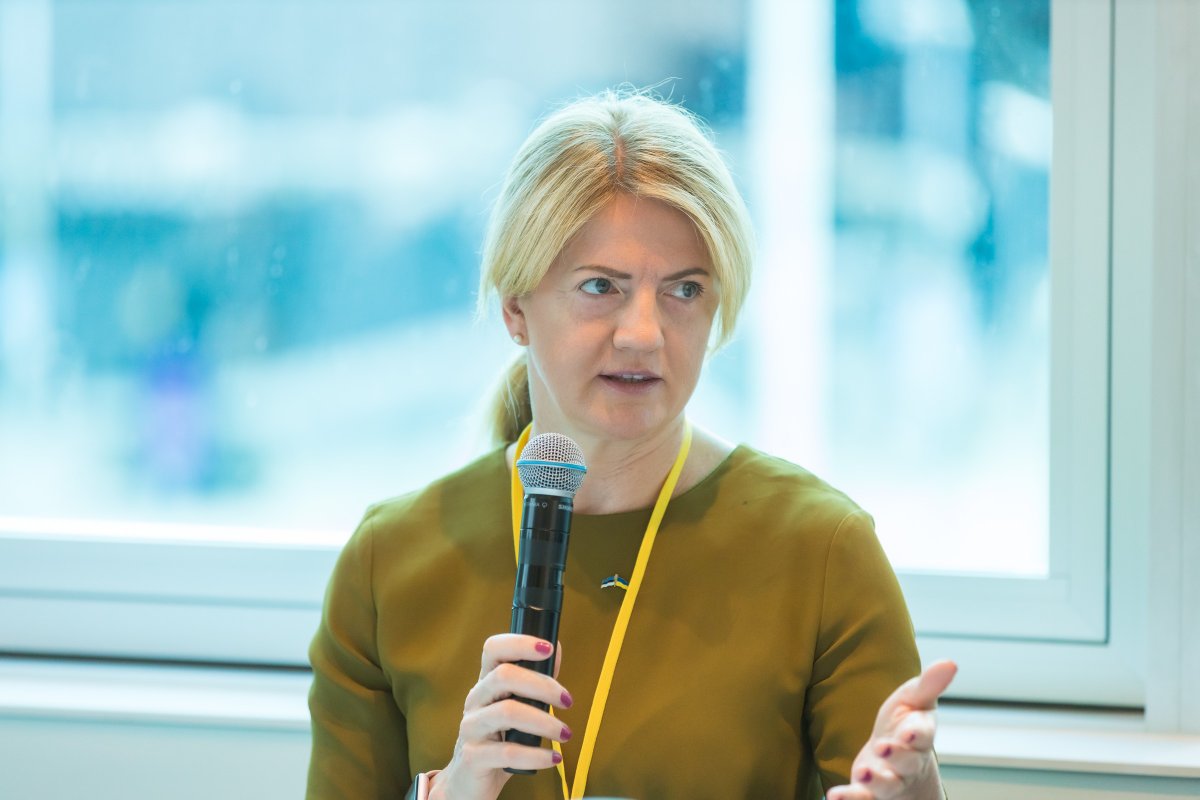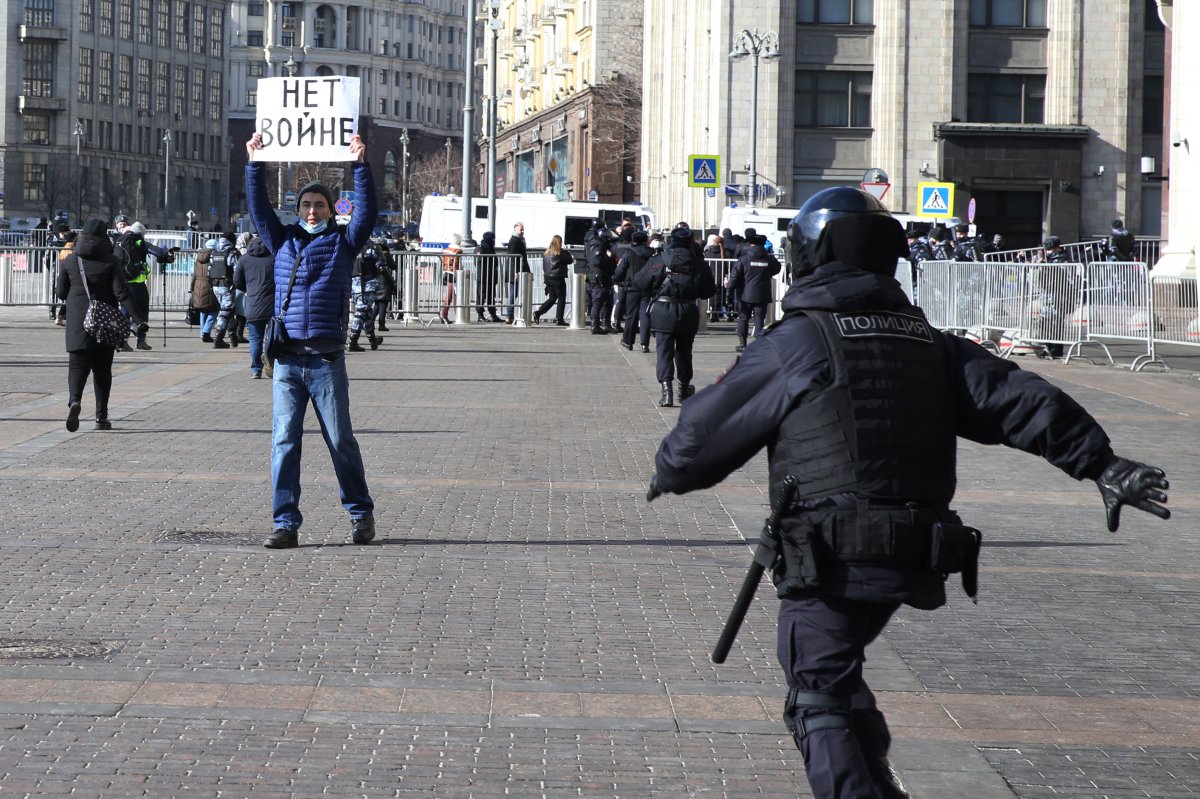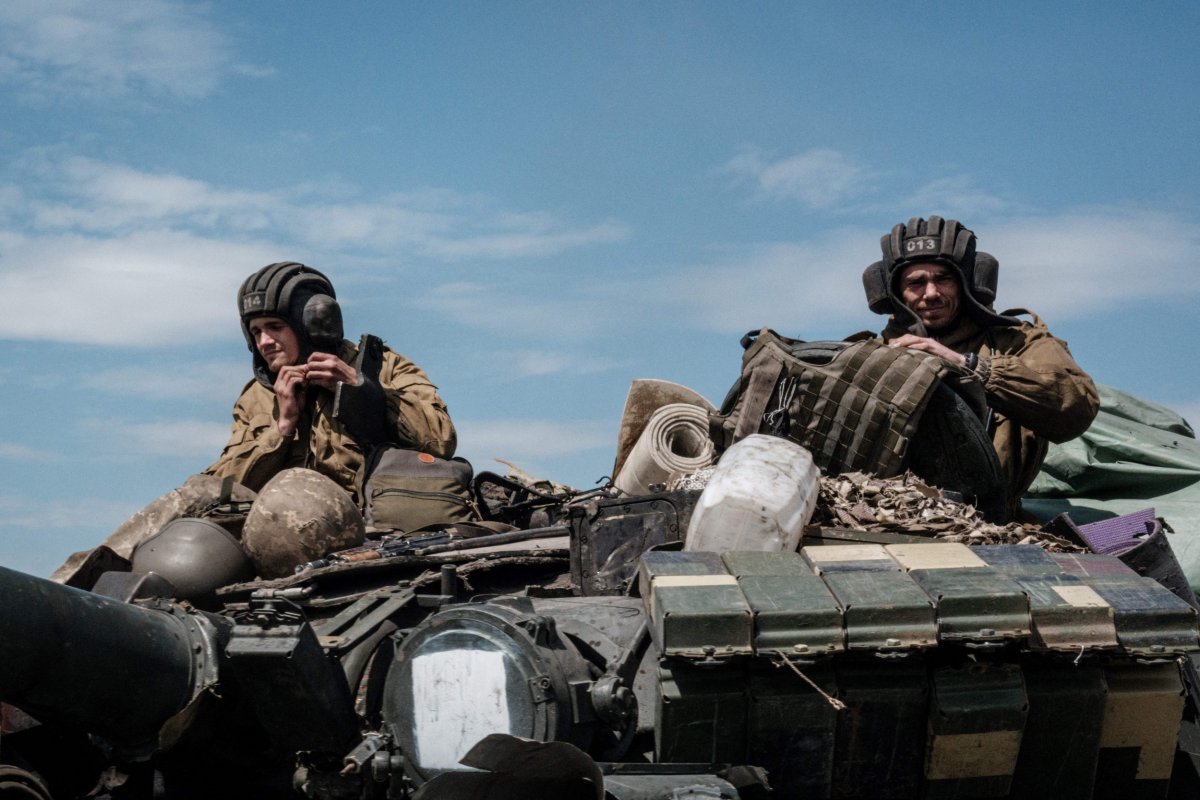The West must intensify pressure on Russia for at least as long as its troops remain on any Ukrainian soil, Estonian Foreign Minister Eva-Maria Liimets has said, suggesting the Kremlin's subsequent weakness may open the door to democratic revolution.
"I truly hope that this international pressure that is in place at the moment to condemn Russia's aggression in Ukraine would lead to the weakening of the regime so that they are no longer able to attack Ukraine or other neighbors," Liimets told Newsweek on the sidelines of the Lennart Meri Conference in Tallinn, Estonia.
"And of course, then we truly hope that democracy would come back to Russia like we saw in the 1990s."
The annual LMC is focused on foreign policy and security issues from a northern and eastern European perspective. This year, the event is dominated by discussions of Russia's ongoing invasion of Ukraine and the imminent expansion of NATO to include Finland and Sweden.

Estonia has long been at the forefront of the NATO and European Union support for Ukraine. Estonia's first delivery of Javelin anti-tank missiles—which have reportedly proven pivotal on the battlefield—arrived in Kyiv on February 18, one week before Russia's latest invasion.
Liimets herself was in Kyiv when Russian bombs and missiles began hitting targets across the country, including in the capital. She and Latvian Foreign Minister Edgars Rinkevics had to quickly leave the country as Russian troops advanced.
NATO expansion
Liimets told Newsweek on Saturday that Estonia intends to set an example for its allies by quickly ratifying any decision by Finland and Sweden to join the NATO alliance. Finnish leaders this week said they would seek membership "without delay." Sweden is expected to follow suit.
"We very much welcome the decision of Finland and Sweden to join NATO," Liimets said. "Of course these decisions need to be supported by the parliaments, so we're not there yet."
"We of course hope that all the NATO allies ratify these protocols as quickly as possible," Liimets said.
Most members appear supportive, and the Finnish-Swedish accession seems almost inevitable, much to Moscow's chagrin. Turkey has been the only dissenting voice, though it is not clear whether Ankara intends to actually block NATO's expansion.
"I think that Turkey, in the end, understands the real threat to the security of allied territories, and also how important it is to extend this area of NATO countries so that together we are stronger," Liimets said. "And then I truly hope that the Turkish parliament will support this application."
Approval must be unanimous for new members to join the alliance, and the required protocols must be ratified by each national parliament.
"It's of course up to every parliament of the member states, but we here in Estonia would like to show a good example and ratify it as quickly as possible," Liimets said. "I sense the same feeling, at least in our neighborhood," the foreign minister said of Estonia's fellow Baltic states.
Estonia, along with its Baltic neighbors, have traditionally been more Russo-skeptic than their fellow EU and NATO counterparts, not least because of their decades of experience of oppression under the Soviet Union. The hawkish Baltic stance on Russia has arguably been vindicated in recent months, with the continent's moral authority somewhat shifting to the east.
Estonia and Latvia, for example, have both committed the equivalent of one third of their annual military budgets to Ukraine's defense. Poland has donated around 13 percent of its annual defense budget.
On Friday, Estonian President Alar Karis used his LMC welcome dinner address to urge fellow EU and NATO nations "to try to surpass us."
Liimets echoed the president's appeal. "We all need to ask what we could do more," she said. "It's really a war between democracy and autocracy. And I think that because of that, we also need to give more support to Ukraine."
Western financial and military aid to Ukraine has been invaluable in helping the defenders repel the invaders. Ukrainian officials are now demanding unconditional victory, even the return of Crimea and Donbas occupied by Russians and their proxies since 2014.
Ukrainian leaders say they also need NATO and EU membership to protect against any future Russian aggression. The former looks unlikely—though the ambition for NATO membership remains enshrined in Ukraine's constitution—while the latter is now in progress, but could take many years.
The European Commission will in June deliver its verdict on whether Ukraine is suitable for EU candidate status, an important landmark on the long and bumpy road to full membership.
Ukraine and EU, NATO
The nations on the bloc's eastern flank have been enthusiastic in their support of Ukraine's full membership. Some others in central and western Europe have been less so.
But leaders in Kyiv hope the bloc will at least grant Ukraine candidate status this summer, even if their appeals for an accelerated membership process appear to have fallen on deaf ears.
"It's really important that Ukraine would get candidacy status to the European Union, because we truly see how they are fighting for democratic values," Liimets said.
"We have been very frank with the Ukrainians also on the further process, that being a candidate does not mean that you are immediately—or that you have a kind of accelerated process to become—a member."
"We think that it's absolutely appropriate to give candidacy status to Ukraine," Liimets said. "And I hope the Commission has enough time to make an appropriate analysis and recommendation for the member states."

Existing EU nations, meanwhile, are debating the bloc's sixth round of sanctions on Russia. This package will include action on Russian oil imports, a key revenue stream for Moscow which Ukraine has consistently demanded be blocked by their European partners.
Hungary is the biggest obstacle to an oil embargo. Prime Minister Viktor Orban said a ban would be like a "nuclear bomb" for the Hungarian economy. Negotiations are ongoing, with those nations already backing deeper sanctions hopeful that Budapest can be swayed.
"Russia is not willing to end this war, and therefore we really should cut off financial flows towards Russia," Liimets said. "We definitely see this current delay as a very unfortunate one. And I truly hope that the Commission comes up with additional ideas on how to engage all the member states to support the sixth package, which would also include oil."
"There are a few member states who are still not 100 percent on board," she explained. "There are differences. I mean that there is support for part of it but not exactly every detail. So we truly hope that next week is again promising to get this sixth package done."
NATO poses an even more difficult question. Ukraine's ambition to join the transatlantic alliance remains a major Russia grievance. Moscow demanded Kyiv be excluded from the bloc before its latest invasion, and will most likely do so in any peace talks.
Though President Volodymyr Zelensky appeared to have given up hope of joining NATO, the matter is not fully settled. Liimets said it was not Tallinn's place to rule out Ukraine's potential accession.
"Estonia has always supported the open-door policy of NATO," she said. "Every sovereign country in Europe has its own right to decide about its security guarantees. And the right applies also for Ukraine. If they decide to apply for NATO membership, it's up to them to decide. So we definitely support the sovereign decision of Ukraine in this regard."
Estonia and its Baltic neighbors are pushing for a more assertive NATO stance on its eastern flank. It is time, they argue, to do away with the enhanced Forward Presence "tripwire" posture, in which multinational forward units would be expected to be overrun by a Russian invasion before a larger NATO response force could arrive.

"We would like to see the permanent nature of these kinds of decisions," Liimets said, referring to the expansion of Estonia's British-Danish-French eFP force earlier this year. Liimets suggested that more and better armed units should be deployed to the eastern flank so that advancing Russian forces would not be able to occupy Baltic territory.
"We don't want to see us being liberated like we saw Bucha liberated," she said, referring to one of the occupied areas where Russian forces left behind evidence of chilling war crimes—which Moscow denies—when they were forced to retreat by Ukrainian counterattacks.
"Bucha was a clear sign of how brutal this war can be. It's like it was during the Second World War."
A costly peace
Ukraine has defied pre-invasion expectations and now talk is turning to what would constitute a victory for Kyiv. Far beyond survival, politicians are now openly discussing the prospect that Ukraine might be able to eject Russia from the country entirely, perhaps even reclaiming the territories lost since 2014.
Ukrainians reacted angrily this week to French President Emmanuel Macron's proposal that Zelensky surrender territory in pursuit of a ceasefire. As before the February invasion, Kyiv is pushing back against any intervention perceived as coercion to accept a detrimental peace.
"We should not push Ukraine to sign anything under the pressure of use of force or any other type of pressure," Liimets said. "It's really up to Ukrainians to decide which kind of negotiated peace agreement they agree on."
"European countries should first really push Russia to withdraw from the soil of Ukraine," Liimets added. "And if Russia continues to occupy parts of the Ukrainian territories, then we should definitely have a long-term non-recognition policy in place. Because Russia has violated international law and we should not tolerate it by any means."
Asked if Russia should also be ejected from Crimea and Donbas, Liimets replied: "Absolutely...Crimea is already annexed by Russia, but it was also done by the use of force, which is against the United Nations Charter. So I think it's clear, and we cannot tolerate it."
"It should be really clear for everyone that a sovereign country like Ukraine is a sovereign European country and has its own right to make all the decisions related to its sovereignty, security guarantees, territorial integrity, and so on," Liimets explained. "Maybe we cannot even speak about a peace agreement yet," she added.
Newsweek has contacted the Russian Foreign Ministry to request comment.
Russia's invasion of Ukraine has unleashed seismic security, financial, and foreign policy realignments in Europe and North America.
Liimets said EU and NATO states should take the opportunity to further isolate Moscow on the world stage.
"We are a little bit in the same situation as we were after the Second World War, where we need to think of creating new structures or reorganizing current structures, which will really help us to implement the rule of law as it's meant to be," Liimets said.
"When I speak about the current structures, of course I think that some of them are functioning well, structures which are based on joint values and democratic values like the EU, NATO."
"But the problem is in the United Nations, the Organization for Security and Co-operation in Europe, where we have seen that Russia—as a member of the United Nations Security Council—has taken the Council hostage with its veto power. I think that we need to find solutions for these kinds of problems."
In an October interview with Newsweek, Liimets urged the U.S. not to lose focus on Europe amid the China challenge which looked set to be the foreign policy centerpiece of President Joe Biden's term.
Russia's invasion of Ukraine has propelled Putin and the Kremlin back to the top of the American list of priorities.
"It's very important that democracies around the world pay attention to this," Liimets said. "And we have been strong advocates of strong transatlantic relations. We truly hope that the U.S. continues to pay attention to what's going on in Europe."
Uncommon Knowledge
Newsweek is committed to challenging conventional wisdom and finding connections in the search for common ground.
Newsweek is committed to challenging conventional wisdom and finding connections in the search for common ground.
About the writer
David Brennan is Newsweek's Diplomatic Correspondent covering world politics and conflicts from London with a focus on NATO, the European ... Read more
To read how Newsweek uses AI as a newsroom tool, Click here.








